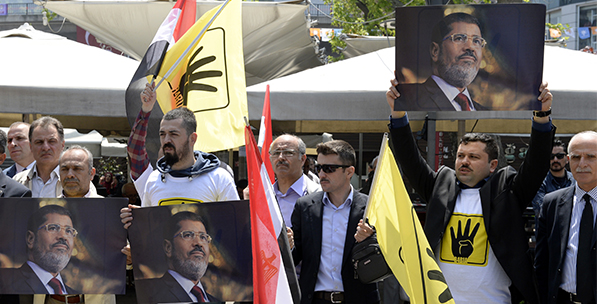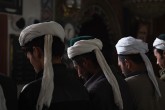An Egyptian court recently sentenced former Egyptian President Mohammed Morsi, who was ousted by then General Abdel-Fattah el-Sissi in 2013, and Muslim Brotherhood leader Mohammed Badie along with more than 100 people. According to news reports, Morsi was found guilty of passing state secrets to Hamas and participating in a 2011 prison break. The fact that the court handed down death sentences to Raed al-Atar, the deceased commander of the Qassam Brigades and theologian Yusuf al-Qaradawi indicates that the purge is not limited to Egypt. The highly politicized judicial proceedings aim to identify the Muslim Brotherhood as a terrorist organization and eliminate its influence across the region, including Palestine. There is no doubt that the Israeli government welcomed the 2013 military coup and the most recent death sentences. At this point it remains to be seen whether the grand mufti of Egypt will confirm the ruling. Meanwhile, some observers argue that the authorities might settle for a lengthy prison sentence instead of capital punishment.
There are at least three ways to interpret the death sentence. First and foremost, certain commentators concentrate on the severity of the punishment, citing Morsi’s background as an elected president, as if a mild punishment would make the situation more acceptable. What they ought to do, however, is to question the legitimacy of Gen. el-Sissi’s regime. It is in this sense that the Turkish government refuses to legitimize the military coup that ousted Morsi while criticizing the international community’s silence. This was exactly why President Recep Tayyip Erdoğan called for the Egyptian government to release Morsi and other political prisoners and allow them to participate in popular elections before bilateral ties can be normalized. Preventing the execution of Morsi and other politicians, however, will not necessarily absolve the international community of its responsibilities.
Another important issue relates to the reluctance of Western governments to condemn the military coup and protest the Sissi regime’s oppression. Surely enough, the European Union and the United States reacted to the death sentence. EU foreign policy chief Federica Mogherini said the court decision “was taken at the end of a mass trial that was not in line with Egypt’s obligations under international law” while noting that the Union was “confident [that] the sentence will be revised during the appeal process.” Meanwhile, a U.S. State Department official said that they were “deeply concerned” about the court decision.
The West’s silence brings to mind a thinly veiled secret that Western governments supported authoritarian regimes in the Middle East. And their assistance has major repercussions. In order for Islamic movements to engage in democratic transformation, their members must believe that they can change their country’s destiny through the ballot box, which requires support from the world’s democracies. Perhaps the most negative case in recent memory was the Algerian experience where the military triggered a civil war by canceling elections to stop the Islamic Salvation Front (FIS). More than 100,000people, consequently, lost their lives. The Arab Spring represented the hope of democratization across the region. Had the Tahrir revolution survived, the Muslim world could have had an entirely different future.
[Daily Sabah, May 25, 2015]
In this article
- Foreign Policy
- Opinion
- 2011
- 2013
- 2015
- Abdel Fattah el-Sisi
- Arab Spring
- Civil War
- Daily Sabah
- Egypt
- Elections
- Europe
- European Foreign Policy
- European Union (EU)
- Gaza
- Hamas
- International Law
- Islam
- Islamic
- Israel
- Israel-Palestine Conflict
- Middle East
- Mohammed Morsi
- Muslim
- Palestine
- President of Egypt
- Recep Tayyip Erdoğan
- The President of the Republic of Türkiye
- Turkish President
- United States (US)
- Western World



